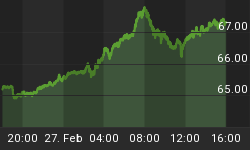More than just a mere liquidity or credit crisis, the current financial storm represents the death throes of the old global economic order, and perhaps the birth pains of a new one. The sun is setting on the borrow and spend culture that has defined us for a generation. Our long ride on the global gravy train is finally coming to an end, and once it does nothing will be the same. The sooner we come to grips with this the better.
Despite the myriad of proposals that are coming from Washington and other world capitals, we must understand that this crisis cannot be cured by governments. In the United States, credit is gone because savings are gone. Our shallow pool of savings has been depleted through bad loans, and we can no longer entice foreigners to lend us their available savings. Given that we are already too loaded up on existing debt they we cannot realistically repay, who can blame them for not wanting to lend us more?
esult, the free market is trying to put an end to our spending spree. Without savings or home equity to fall back on, Americans struggling with rising prices are finally being forced to cut back. This has terrified our leaders and is causing them to dismantle the remaining structure of our free enterprise-based economic system.
The intention of all these daily federal interventions is to keep the credit spigots open so Americans can go even deeper into debt to buy more stuff they can't actually afford. This should be clear enough to anyone who listens to what our leaders are actually saying. When speaking about the need for an even larger fiscal stimulus package, Barney Frank, chairman of the House Financial Services Committee, said, "We have to prop up consumption." He has it backwards. The government has been propping up consumption for far too long, and the best thing they can do now is remove the props so spending can be replaced by savings.
The sad reality is that we borrowed and spent our way into this crisis, and we are not going to borrow and spend our way out of it. Legitimate credit can only be supplied if there are genuine savings to finance it. Savings can't be magically concocted into existence by a printing press, but can only be created by consumers who spend less than they earn. Efforts to fool the market will not work and will ultimately lead to a monetary disaster and runaway inflation.
Were the government to allow market forces to work, Americans would now have to pay cash for their consumption. That would mean no instant credit for new cars, plasma TVs, appliances, consumer electronics, clothing, furniture, etc. Unless buyers actually had the cash in their checking accounts these purchases would have to be deferred. From an economic perspective this is precisely what the doctor ordered. But for an economy based 72 percent on consumer spending, the medicine will go down hard.
Ultimately, a serious reduction in consumer and mortgage credit, combined with an increase in personal savings, would again provide a pool of needed capital for businesses to produce products and provide employment opportunities. However, the danger is that this potential credit could be completely crowded out by massive borrowing by the Federal Government. In addition, prices for such things as houses and college tuition will fall sharply, as the credit artificially propping them up disappears. People would still be able to buy houses and send their kids to college only they would pay much lower prices when they do.
However, if the government keeps creating inflation to artificially sustain consumer borrowing and spending, there will be no savings left to fund anything and prices will be so high that despite massive consumer spending there will be few goods that Americans could actually afford to buy.
For a more in depth analysis of our financial problems and the inherent dangers they pose for the U.S. economy and U.S. dollar denominated investments, read my new book "Crash Proof: How to Profit from the Coming Economic Collapse." Click here to order a copy today.
For an updated look at my investment strategy order a copy of my just released book 'The little Book of Bull Moves in Bear markets." Click here to order your copy now.
More importantly, don't wait for reality to set in. Protect your wealth and preserve your purchasing power before it's too late. Discover the best way to buy gold at www.goldyoucanfold.com. Download my free Special Report, "The Powerful Case for Investing in Foreign Securities" at www.researchreportone.com. Subscribe to my free, on-line investment newsletter, "The Global Investor" at http://www.europac.net/newsletter/newsletter.asp.















